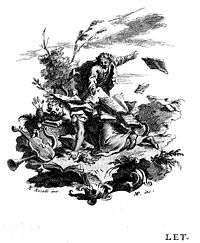Saverio Bettinelli

Saverio Bettinelli (18 July 1718 – 13 September 1808) was an Italian Jesuit writer.
Life

He was born at Mantua.
Saverio entered the Jesuit order in 1738 and became known as a polymath, dramatist, polemicist, poet, and literary critic. He taught Rhetoric in various Italian cities, until in 1758 he set out to travel through Italy and Germay. In his travels he met Voltaire and Rousseau, In 1773, with the suppression of the Jesuits, he had to abandon his teaching post at Modena,[1] and he retired to Mantua where he died in 1808.
He taught literature from 1739 to 1744 at Brescia, where Cardinal Quirini, Count Mazzuchelli, Count Duranti and other scholars, formed an illustrious academy. He next went to Bologna, to study divinity. At the age of thirty he went to Venice, where he became professor of rhetoric. The superintendence of the college of nobles at Parma was entrusted to him in 1751; and he had principal charge of the studies of poetry and history, and the entertainments of the theatre. He remained there eight years, visiting, at intervals, other cities of Italy, often on the affairs of his order.
In 1755 he travelled in Germany, proceeded as far as Strasbourg and Nancy, and returned by way of Germany into Italy, taking with him two young sons or nephews of the prince of Hohenlohe, who had requested him to take charge of their education. The year following, he journeyed again to France, along with the eldest of his pupils; and during this excursion he wrote his famous Lettere dieci di Virgilio agli Arcadi, which were published at Venice. Bettinelli was also a poet of arcadic verse, collected in his Versi sciolti of 1758 and inspired by Frugoni and Algarotti, and of some tragedies including Gionata (1774), Demetrio Poliorcete (1758), Serse (1764) that were put on for the jesuit theater.
In 1758 he went to Lorraine, to the court of King Stanislaus, who sent him on a matter of business to visit Voltaire. From Geneva he returned to Parma, where he arrived in 1759. He afterwards lived for some years at Verona and Modena, and he had just been appointed professor of rhetoric there, when, in 1773, the suppression of the Jesuit Order occurred in Italy. Bettinelli returned home, and resumed his literary labours with new ardor. The siege of Mantua by the French compelled him to leave the city, and he retired to Verona, where he formed an intimate friendship with the chevalier Hippolito Pindemonti.
His major works are the literary criticisms and observations of culture. In 1757, he penned a series of letters addressed to Virgil in which he criticized the Divine Commedy by Dante Alighieri, and affirmed that Among the erudite books, only certain parts from the Divine Comedy should be included, and these would form no more than five cantos [2] Voltaire was to praise his idiosyncratic opinions.
In 1766 he wrote Lettere inglesi where he proposes good taste in modern literature. In the enthusiasm of fine arts or Dell'entusiasmo delle belle arti, from 1769, where he exalts enthusiasm as a source of inspiration for fantasy in art according to a tendency that was pre-romantic.
Among his main works is a sketch of the progress of literature, science, fine arts, industry, and customs in Italy, originally title Risorgimento negli studi, nelle, Arti e ne' Costumi dopo di Mille.[3]
In 1797 he returned to Mantua. Though nearly eighty years old, he resumed his labors and his customary manner of life. He undertook in 1799 a complete edition of his works, which was published at Venice in 24 vols. At this death at the age of ninety years, he still retained his gaiety and vivacity of mind.[4]
References
| Wikimedia Commons has media related to Saverio Bettinelli. |
- ↑ G. F. Galeani Napione (1809), Vita dell'abate Saverio Bettinelli , Page 91, Turin, Italy: Presso i Fratelli Pomba
- ↑ "Sia posto tra i libri di erudizione, e della Commedia si lascino solo taluni pezzi che, raccolti e, come meglio si può, ordinati, formino non più di cinque canti." Saverio Bettinelli - Lettere di Virgilio agli Arcadi di Rome — Lettera IX.
- ↑ Saverio Bettinelli (1786), Del Risorgimento d'Italia negli studi, nelle arti, e ne' costumi dopo il Mille, Spese Remondini of Venice: Bassano, Italy
- ↑ Chisholm 1911.
- Attribution
 This article incorporates text from a publication now in the public domain: Chisholm, Hugh, ed. (1911). "Bettinelli, Saverio". Encyclopædia Britannica. 3 (11th ed.). Cambridge University Press.
This article incorporates text from a publication now in the public domain: Chisholm, Hugh, ed. (1911). "Bettinelli, Saverio". Encyclopædia Britannica. 3 (11th ed.). Cambridge University Press.
Works
- Saverio Bettinelli, Dieci Lettere di Publio Virgilio Marone scritte dagli Elisi all'Arcadia di Rome sopra gli abusi introdotti nella poesia italiana, Venezia: Fenzo, 1758
- Saverio Bettinelli, Dodici Lettere Inglesi sopra varii argomenti e sopra la letteratura italiana, Venezia: Pasquali, 1766
- Opere edite e inedite in prosa e in versi dell'abate Saverio Bettinelli, Venezia: Presso Adolfo Cesare, 1799-1801, in 24 volumi